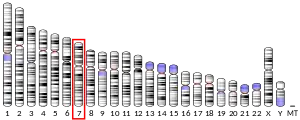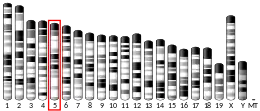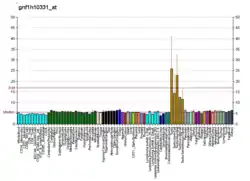STEAP2
Metalloreductase STEAP2 is an enzyme that in humans is encoded by the STEAP2 gene.[5][6][7]
This gene is a member of the STEAP family and encodes a multi-pass membrane protein that localizes to the Golgi complex, the plasma membrane, and the vesicular tubular structures in the cytosol.
A highly similar protein in mouse has both ferri reductase and cupric reductase activity, and stimulates the cellular uptake of both iron and copper in vitro. Increased transcriptional expression of the human gene is associated with prostate cancer progression. Alternate transcriptional splice variants, encoding different isoforms, have been characterized.[7]
References
- GRCh38: Ensembl release 89: ENSG00000157214 - Ensembl, May 2017
- GRCm38: Ensembl release 89: ENSMUSG00000015653 - Ensembl, May 2017
- "Human PubMed Reference:". National Center for Biotechnology Information, U.S. National Library of Medicine.
- "Mouse PubMed Reference:". National Center for Biotechnology Information, U.S. National Library of Medicine.
- Walker MG, Volkmuth W, Sprinzak E, Hodgson D, Klingler T (Jan 2000). "Prediction of Gene Function by Genome-Scale Expression Analysis: Prostate Cancer-Associated Genes". Genome Res. 9 (12): 1198–203. doi:10.1101/gr.9.12.1198. PMC 310991. PMID 10613842.
- Korkmaz KS, Elbi C, Korkmaz CG, Loda M, Hager GL, Saatcioglu F (Sep 2002). "Molecular cloning and characterization of STAMP1, a highly prostate-specific six transmembrane protein that is overexpressed in prostate cancer". J Biol Chem. 277 (39): 36689–96. doi:10.1074/jbc.M202414200. PMID 12095985.
- "Entrez Gene: STEAP2 six transmembrane epithelial antigen of the prostate 2".
Further reading
- Denoeud F, Kapranov P, Ucla C, et al. (2007). "Prominent use of distal 5′ transcription start sites and discovery of a large number of additional exons in ENCODE regions". Genome Res. 17 (6): 746–59. doi:10.1101/gr.5660607. PMC 1891335. PMID 17567994.
- Ohgami RS, Campagna DR, McDonald A, Fleming MD (2006). "The Steap proteins are metalloreductases". Blood. 108 (4): 1388–94. doi:10.1182/blood-2006-02-003681. PMC 1785011. PMID 16609065.
- Korkmaz CG, Korkmaz KS, Kurys P, et al. (2005). "Molecular cloning and characterization of STAMP2, an androgen-regulated six transmembrane protein that is overexpressed in prostate cancer". Oncogene. 24 (31): 4934–45. doi:10.1038/sj.onc.1208677. PMID 15897894.
- Sanchez-Pulido L, Rojas AM, Valencia A, et al. (2005). "ACRATA: a novel electron transfer domain associated to apoptosis and cancer". BMC Cancer. 4: 98. doi:10.1186/1471-2407-4-98. PMC 546010. PMID 15623366.
- Ota T, Suzuki Y, Nishikawa T, et al. (2004). "Complete sequencing and characterization of 21,243 full-length human cDNAs". Nat. Genet. 36 (1): 40–5. doi:10.1038/ng1285. PMID 14702039.
- Clark HF, Gurney AL, Abaya E, et al. (2003). "The Secreted Protein Discovery Initiative (SPDI), a Large-Scale Effort to Identify Novel Human Secreted and Transmembrane Proteins: A Bioinformatics Assessment". Genome Res. 13 (10): 2265–70. doi:10.1101/gr.1293003. PMC 403697. PMID 12975309.
- Porkka KP, Helenius MA, Visakorpi T (2002). "Cloning and characterization of a novel six-transmembrane protein STEAP2, expressed in normal and malignant prostate". Lab. Invest. 82 (11): 1573–82. doi:10.1097/01.lab.0000038554.26102.c6. PMID 12429817.
This article is issued from Wikipedia. The text is licensed under Creative Commons - Attribution - Sharealike. Additional terms may apply for the media files.






